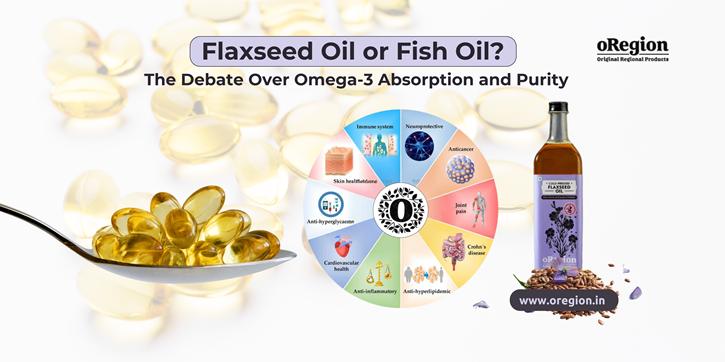
Flaxseed Oil or Fish Oil? The Debate Over Omega-3 Absorption and Purity
By oregion foodsOmega-3 fatty acids are a cornerstone of health and wellness, contributing to improved heart function, brain development, and reduced inflammation. Among the rich sources of these essential fatty acids are flaxseed oil and fish oil. The choice between these two depends on multiple factors, including absorption efficiency, purity, and individual health needs. In this comprehensive guide, we explore the key differences between flaxseed oil and fish oil, their omega-3 absorption potential, and concerns about contamination in fish oil products. Let’s delve into this important debate.
Flaxseed Oil vs. Fish Oil: Key Differences
Composition of Omega-3 Fatty Acids
Cold Pressed Flaxseed oil, commonly referred to as Alsi Ka Tel, is a rich source of alpha-linolenic acid (ALA), a plant-based omega-3 fatty acid known for its numerous health benefits. ALA plays a crucial role in maintaining overall health and is especially valued for its potential to support heart, brain, and joint health. While the body can convert ALA into other forms of omega-3s, such as eicosapentaenoic acid (EPA) and docosahexaenoic acid (DHA), flaxseed oil provides a natural and sustainable way to include omega-3s in your diet.
Unlike marine sources, flaxseed oil offers an entirely plant-based solution, making it ideal for vegetarians, vegans, and those seeking eco-friendly alternatives. It is also versatile, easily incorporated into smoothies, dressings, or consumed as a supplement, allowing for effortless integration into daily routines.
Flaxseed oil’s Benefits extend beyond omega-3 content, as it also contains lignans and antioxidants that support overall wellness. For individuals seeking a natural, plant-derived way to enhance their omega-3 intake and boost health holistically, flaxseed oil is an excellent choice.
Potential Health Benefits
Flaxseed Oil:
-
Supports gastrointestinal health.
-
Acts as a laxative and anti-diarrheal.
-
Promotes bowel consistency.
- Offers a vegan omega-3 option, perfect for those avoiding animal products.
Fish Oil:
-
Enhances heart and brain function.
-
Reduces inflammation in joints and skin.
-
Promotes fetal brain development during pregnancy.
- Contributes to ocular and immune health.
The Reality of Fish Oil and Omega-3 Absorption
Fish oil’s dominance in the Omega-3 market stems from its superior absorption efficiency. However, not all fish oils are created equal. Two primary forms of omega-3s in fish oil are ethyl ester (EE) and triglyceride (TG) forms. Understanding the distinction is crucial for informed supplementation.
Ethyl Ester vs. Triglyceride-Based Omega-3
-
Ethyl Ester (EE): This form of fish oil is created during processing and involves bonding omega-3s to ethanol. While EE omega-3s are cheaper to produce, they are less bioavailable, meaning the body absorbs them less efficiently.
- Triglyceride (TG): The natural form of omega-3s, TG fish oils mimic the structure found in whole fish, offering superior absorption and efficacy.
Unfortunately, many fish oil products on the market are based on the EE form, yet consumers are often unaware of this distinction. As a result, they may not receive the full spectrum of benefits expected from omega-3 supplementation.
Concerns About Heavy Metal Contamination
One significant drawback of fish oil is the potential for contamination with heavy metals such as mercury. Mercury accumulation in fish is a result of environmental pollution and can pose serious health risks, particularly to:
-
The central nervous system
-
The cardiovascular system
- Pregnant women and developing fetuses
To minimize these risks, choose the safer alternative to fish oils. Certifications from reputable third-party organizations can provide additional assurance of purity.
Vegan Omega-3 Alternatives
For those seeking a vegan omega-3 supplement, cold-pressed flaxseed oil is an optimal choice. Cold pressing preserves the oil’s nutrients, ensuring maximum potency and health benefits. Brands like oRegion Flaxseed Oil provide high-quality, regional flaxseed oil produced using the wood-pressed method, maintaining purity and nutritional integrity.
Benefits of Cold-Pressed Flaxseed Oil
-
Rich in polyunsaturated fatty acids (PUFA).
-
Supports heart, brain, and eye health.
-
Reduces inflammation in the body.
- Ideal for vegetarians and vegans.
Pro Tip: Store flaxseed oil in an airtight container away from sunlight to preserve its freshness and prevent rancidity.
Choosing the Right Omega-3 Supplement
When deciding between flaxseed oil and fish oil, consider the following:
-
Dietary Preferences: Flaxseed oil is ideal for vegetarians and vegans, while fish oil is more suitable for omnivores.
-
Health Goals: If you need higher levels of EPA and DHA for cardiovascular or cognitive health, fish oil is the better choice.
- Safety Concerns: To avoid heavy metal contamination, choose molecularly distilled fish oil or opt for flaxseed oil.
oRegion’s Flaxseed Oil: The Superior Choice
oRegion Flaxseed Oil stands out as a high-quality product tailored for health-conscious individuals. Its unique features include:
-
Made from native brown flax seeds cultivated through sustainable farming methods.
-
Cold-pressed extraction to preserve essential nutrients.
-
Free from additives and artificial preservatives.
- A versatile oil suitable for cooking (excluding deep frying), salad dressing, and supplementation.
Final Thoughts
Both flaxseed oil and fish oil offer remarkable health benefits, but their suitability varies depending on individual needs and preferences. While fish oil excels in delivering high levels of EPA and DHA, flaxseed oil is a clean, sustainable alternative for those adhering to plant-based diets. To ensure the best outcomes, select high-quality products like oRegion Flaxseed Oil, which combine nutritional excellence with purity.












